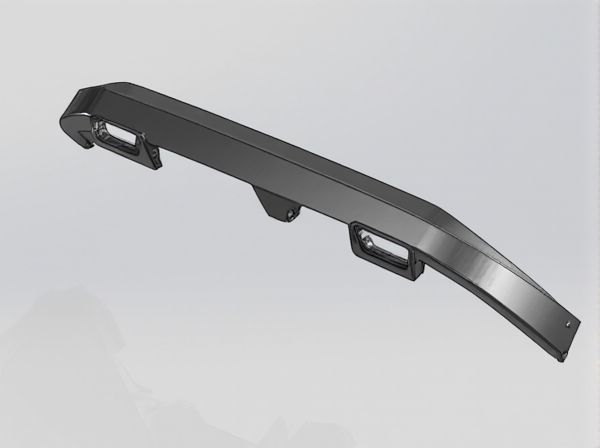
Photo illustration: Steel Bumper vs Aluminum Bumper
Steel bumpers offer superior strength and durability, making them ideal for heavy-duty protection and off-road use. Aluminum bumpers are lightweight and resistant to corrosion, enhancing your vehicle's fuel efficiency and longevity without sacrificing too much strength. Choosing between steel and aluminum depends on whether you prioritize rugged toughness or lighter weight for your vehicle's needs.
Table of Comparison
| Feature | Steel Bumper | Aluminum Bumper |
|---|---|---|
| Weight | Heavy, increases vehicle weight | Lightweight, improves fuel efficiency |
| Durability | High strength, resistant to impacts | Corrosion-resistant but less impact resistant |
| Cost | Generally less expensive | Higher initial cost |
| Corrosion Resistance | Prone to rust without coating | Inherently corrosion-resistant |
| Maintenance | Requires periodic painting and rust prevention | Low maintenance |
| Repairability | Easier to repair and weld | More difficult to repair |
Introduction: Steel Bumper vs Aluminum Bumper
Steel bumpers offer superior strength and durability, making them ideal for heavy-duty applications and off-road protection. Aluminum bumpers provide lightweight advantages with excellent corrosion resistance, enhancing vehicle performance and fuel efficiency. Choosing between steel and aluminum bumpers depends on balancing the need for toughness versus weight savings and rust prevention.
Material Composition and Properties
Steel bumpers are composed primarily of carbon steel, providing exceptional strength, durability, and impact resistance due to their dense molecular structure. Aluminum bumpers utilize aluminum alloys, offering a lighter weight alternative with excellent corrosion resistance and moderate strength, making them ideal for weight-sensitive applications. The higher tensile strength of steel results in superior crash protection, whereas aluminum's lightweight properties contribute to improved fuel efficiency and vehicle handling.
Weight Comparison
Steel bumpers weigh significantly more than aluminum bumpers, with steel typically ranging between 70 to 150 pounds depending on design and thickness, whereas aluminum bumpers usually weigh around 30 to 60 pounds. The higher density of steel, approximately 490 lbs/ft3, contributes to its increased weight, compared to aluminum's density of about 168 lbs/ft3. Choosing aluminum bumpers can improve vehicle fuel efficiency and handling due to the substantial reduction in front-end weight.
Strength and Durability
Steel bumpers offer exceptional strength due to their high tensile properties, making them ideal for heavy-duty impact resistance and off-road protection. Aluminum bumpers provide superior corrosion resistance and are much lighter, but they typically sacrifice some impact durability compared to steel. Choosing between steel and aluminum bumpers depends on the balance between weight savings and the need for maximum strength and long-term durability in harsh conditions.
Corrosion Resistance
Steel bumpers provide superior strength but are highly susceptible to corrosion if not properly coated or maintained, especially in salty or humid environments. Aluminum bumpers offer excellent corrosion resistance due to the natural oxide layer that forms on their surface, reducing the need for frequent maintenance. This makes aluminum bumpers a preferred choice for vehicles operating in coastal or wet conditions where rust prevention is critical.
Safety Performance
Steel bumpers provide superior impact resistance and durability due to their higher tensile strength, making them highly effective in protecting vehicles during collisions. Aluminum bumpers offer better energy absorption and reduce overall vehicle weight, which can improve crash dynamics and fuel efficiency while maintaining reasonable safety standards. In terms of safety performance, steel bumpers excel in preventing structural damage, whereas aluminum bumpers contribute to improved handling and controlled deformation in crashes.
Installation and Compatibility
Steel bumpers typically require more complex installation processes due to their heavier weight and need for reinforced mounting brackets, often demanding professional installation to ensure proper alignment and safety. Aluminum bumpers offer easier installation because of their lighter weight and compatibility with a wider range of vehicle models and aftermarket accessories, reducing labor time and potential modifications. Compatibility varies with vehicle frames; steel bumpers are preferred for heavy-duty trucks with robust frames, while aluminum bumpers suit lighter vehicles seeking corrosion resistance and improved fuel efficiency.
Cost Analysis
Steel bumpers typically cost between $200 and $600, offering superior durability and impact resistance for off-road vehicles, while aluminum bumpers range from $300 to $900, valuing lightweight advantages and corrosion resistance. The cost difference reflects not only material prices but also fabrication complexities, with steel requiring heavy welding and aluminum demanding precision machining to avoid deformation. Long-term expenses favor steel for high-impact scenarios due to repairability, whereas aluminum may reduce fuel consumption costs due to its lighter weight.
Aesthetic and Customization Options
Steel bumpers offer a rugged, industrial aesthetic favored for off-road and heavy-duty vehicles, with customizable options like welded mounts, winch compatibility, and integrated lightbars. Aluminum bumpers provide a sleek, modern look that complements contemporary vehicle designs, featuring anodized finishes and modular components for personalized styling. Both materials support aftermarket accessories, but steel allows more intricate fabrication, while aluminum emphasizes lightweight, corrosion-resistant customization.
Conclusion: Which Bumper Is Right for You?
Steel bumpers offer superior strength and impact resistance, making them ideal for heavy-duty use and off-road protection. Aluminum bumpers provide lighter weight and corrosion resistance, enhancing vehicle fuel efficiency and durability in harsh environments. Choosing between steel and aluminum bumpers depends on whether you prioritize maximum durability or weight savings for your specific driving needs.
 caratoz.com
caratoz.com